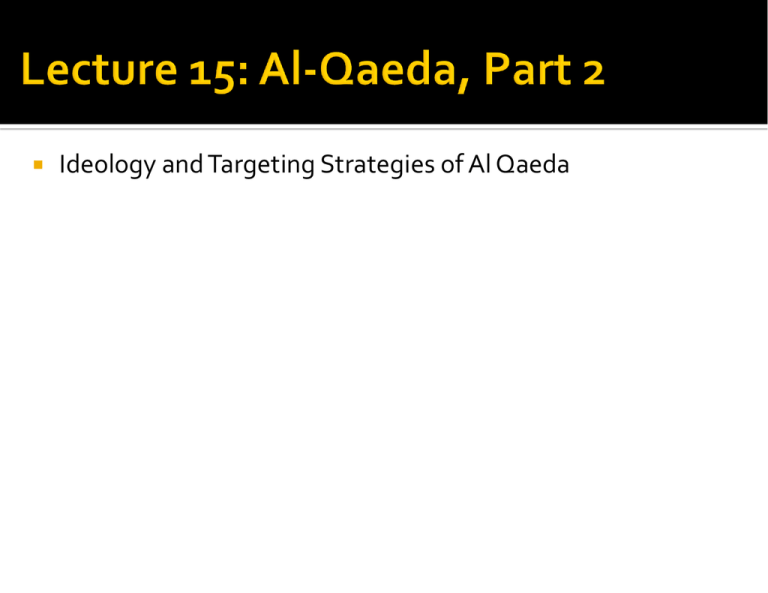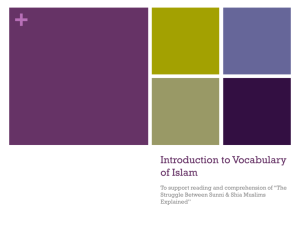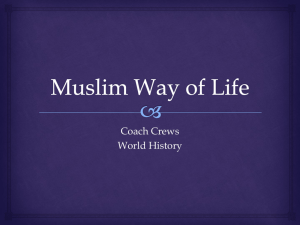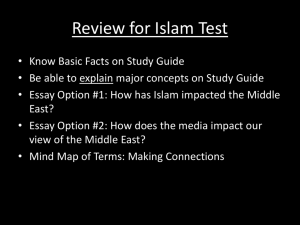Al-Qaeda Part 2 - James JF Forest
advertisement

Ideology and Targeting Strategies of Al Qaeda Al Qaida and affiliated groups Mecca—center for trade, religion (idolatry) Muhammad claimed revelations (God’s truth revealed) Hijra—Flight to Yathrib/Medina. Establishes theocracy Islam (Submission to Will of God) Islam as political and religious: no separation of church and state Islam must govern all aspects of human behavior; Man must be ruled by laws of God, not laws of Man Muslim (one who submits). Qur’an - Literal word of God. Emphasis on obedience to duties (A reaction against Arabian anarchism) Authorities: ulama--scholars muftis--jurists. Consultants to religious courts qadis--judges Conquered Mecca, unified tribes Five Pillars of Faith The Profession: One God, Allah, Muhammad his Prophet Salah (Prayer) Zakat (Alms) Fasting during Ramadan Hajj—pilgrimage to Mecca at least once (note: Jihad is not one of these; but it is for fundamentalists) Ummah—community. Islam is social, not just individual. Subject to Shari’a. Trans-national. One God, Allah, and Muhammad is his prophet. Radical Monotheism. Tawhid--“oneness.” God’s will is for all creation, all of life. Muhammad--a prophet, not a divine being. “Dar al-Islam” and “Dar al-Harb” (“Territory of peace” vs. “Territory of war”) Shari’a (The Way, The Law of Islam). Legitimized by Sunna—behavior, practice, and sayings of the prophet in Medina Hadith—spoken decisions or judgments 1.2 billion Muslims (approx. 19% of world’s population) • Iran, Iraq, Bangladesh, Pakistan, India, Indonesia, Africa, Arab countries. Arabs only about 15% of Muslims. • 6 million in U.S. (disputed) • Approx. 40 million in Former Soviet Union Sunni • Mainstream. More flexible. Accepted early caliphate (khalifa “successor”) as legitimate. • Approx. 90% of Muslims worldwide Shi’a, Shiite • Shi’a (Shi’ites) (Party of Ali, married to Muhammad’s daughter; father of his only male descendants). • More fundamentalist. Claim direct line to Muhammad through Ali and sons, Hasan and Husayn. Caliphs seen as usurpers. • Majority in Iran, Iraq & Persian Gulf countries (Taqi al-Din) Ibn Taymiyya (1263-1328): influenced by threats to the ummah from both Crusaders and Mongols - Leader who doesn’t enforce shari’a completely, wage active jihad against infidels is unfit to rule - Muslim who doesn’t live by requirements of the faith is an unbeliever Jihad described as fighting in the path of God in Qur’an, hadith: defense of the ummah, then spread of the faith Sufis: concept of “greater jihad” as internal struggle that is necessary for spiritual insight Wahhabi movement Arabia, led by Muhammad Ibn 'Abd al-Wahhab (1703-92). (Conflict with Muslim states, not the west.) Basic teaching: tawhid. The transcendent unity of God. No compromise possible. Sought perfect faith and practice by individuals. Emphasized the universalistic character of Islam, global community of the faithful—the ummah. Supported by Muhammad al-Sa'ud, local ruler. Strengthened each other. Nineteenth Century Factors Encroachment of the West: capital, financial systems, European immigrants. Western colonial control; economic dependence Widespread social dislocation. Efforts to adapt Western ideas, structures, and technology. Failure, corruption of Islamic regimes Twentieth Century Factors Inability to restore early purity of Islamic faith and practice, regain lost glory and prestige Arrival of European colonialism, economic exploitation, alien culture Rulers reformed laws, education, economies but continue to struggle for stability and legitimacy Social changes disrupted, traumatized populace Post-World War II independence accelerates modernization drive, intensifies identity crisis Disillusionment peaks in 1970s: rejection of Western civilization as a model, rise of radical groups Hasan al-Banna (1906-1949, Egyptian): “On Jihad” in Five Tracts of Hasan al-Banna; Towards the Light Sayyid Abul A’la Mawdudi (1903-1979, Indo-Pakistani): Jihad in Islam; Islam and Jahiliyya; “Mischief of Takfir” Sayyid Qutb (1906-1966, Egyptian), “Al-Qaida’s Philosopher”: Social Justice in Islam; In the Shade of the Qur’an; Milestones Abdullah Azzam (1941-1989, Palestinian), “Godfather of Jihad”: Join the Caravan; Defense of Muslim Lands Ayman al-Zawahiri (1951- present, Egyptian): Knights Under the Prophet’s Banner; Loyalty and Enmity: An Inherited Doctrine and a Lost Reality Note: Underlined works are most significant; most are available from the Internet Schoolteacher; Formed Muslim Brotherhood in 1928. Educational, devotional, service Rival to Wafd political party, threat to government (King Farouk). Upheaval in 1948. Suppressed. “Free Officers” led by Gamel Abdel Nasser took control of Egypt in 1952. MB crushed. Still exists in more moderate form. Primary means to restore Islamic character to society is vigorous preaching and teaching (da’wa) campaign; direct political action not appropriate or effective Gradualist approach to build a strong Muslim state governed by shari’a: reIslamization through four stages starting with individuals, then families, then communities, which will band together to form a true Islamic state Influenced radicals by redefining jihad: God-ordained defensive requirement for all Muslims, as long as unbelievers rule any Islamic lands; greater jihad is armed physical struggle against injustice and unbelief, not the internal spiritual struggle Journalist and prolific writer on issues of religious faith, and the proper relationship between Islam and the political structure, law, and practices of the state Writings became available in Arabic in 1950s Islam wants to employ all forces and means that can be employed for bringing about a universal all-embracing revolution. This far-reaching struggle that continuously exhausts all forces and this employment of all possible means is called jihad.” Jihad In Islam, 1939 First Islamist writer to approach jihad systematically: - Warfare not just for political control, but to establish just rule - Jihad becomes war of liberation: links concept to anti-colonialism, “national liberation movements,” and Arab resistance to Israel Professor at Al-Azhar University Jahiliyya (unbelievers) Takfir (identifying unbelievers) Hijrah—devout must withdraw if necessary, create activist movement. Rationale for revolution. Qutb’s “Manhaj”: 4-Phased Process 1. Vanguard (taliya) of the movement (jama’a) is formed 2. Vanguard sounds the call (da’wah) to society to turn back to God, but is persecuted for its faith, oppressed by the system 3. Movement undergoes hijra: conscious separation (spiritual and/or physical detachment) from the jahili system, and the group purifies itself, unifies and grows in strength 4. Victory and consolidation of power: movement conducts a jihad by force to overthrow the apostate government, and restores the community to just rule and the practice of true Islam (through institution solely of the shari’a); God himself grants the victory and is once again sovereign "…Every Muslim on earth should unsheath his sword and fight to liberate Palestine. The Jihad is not limited to Afghanistan…There will be no solution to the Palestinian problem except through jihad…“ “Jihad means fighting. You must fight in any place you can get. Whenever Jihad is mentioned in the Holy Book, it means the obligation to fight. It does not mean to fight with the pen or to write books or articles in the press or to fight by holding lectures… Jihad and the rifle alone: no negotiations, no conferences, no dialogues." “The Jihad in Afghanistan will broaden until the entire world will be conquered because Allah has promised the victory to Islam." “Our message to you is clear, strong and final: There will be no salvation until you withdraw from our land, stop stealing our oil and resources and end support for infidel, corrupt rulers.” “There is no reform except through jihad, ... We have to realize the nature of this conflict: Our enemies do not agree with or approve of our rights.” “Every Muslim in Pakistan must do his or her best in getting rid of this government, which cooperates with the enemies,” “Americans will not allow any Islamic regime to reach the position of governance except if it is an accomplice to the Americans, just like what is happening right now in Iraq.” “God willing, we will continue targeting the keys of the American economy.” Ayatollah Ruhollah Khomeini (1902-1989, Iranian): Islamic Government (though a Shi’ite, his success encourages all Islamists) Muhammad ‘Abd al-Salam Faraj (1952-1982, Egyptian): The Neglected Duty Abu Musab al-Suri (1958-present, Syrian), 20-hour lecture series (August 2000), 1,600-page book, The Call for Global Islamic Resistance (December 2004) “individual terrorism” is needed to replace the hierarchical, more traditional approach to terrorism a “mass participation jihadist movement” is needed in which individuals attack targets worldwide “where it hurts the enemy and costs home the most” and “where it awakens Muslims and revives the spirit of jihad and resistance.” Note: Underlined works are most significant; most are available from the Internet Sense of crisis from Muslim states’ backwardness/weakness, challenges from modernization History of blaming problems on others, victimization World is a perpetual battlefield between faith and unbelief; no coexistence or compromise Islam is a revolutionary “liberation” movement: required to alter the unjust political, economic and social status quo Opposition to “fitna” (anarchy, community discord) leads to acquiescence of authoritarian regimes Current regimes are apostate, must be deposed Struggle (jihad) is required until all lands are under Muslim control: reestablish the caliphate Goal of God’s utopia: phased process to build ideal society, governed only by the shari’a Wahhabists advocate strict return to fundamentals of the faith, reject any behavior not conducted or supported by the Prophet Muhammad - Inspired by the ideas of Ibn Taymiyya - Belief in their own moral legitimacy - One true path, that of the original founders of Islam - Known outside Saudi Arabia as Salafis or Salafist (Companions of the Prophet Muhammed) Saudi, Egyptian, other regimes: un-Islamic behavior, thus apostate rulers which must be overthrown (“Forefathers”): all interpret the Qur’an literally, but most disagree with radicals on the permissibility of armed jihad as a religious duty, and with specific tactics in warfare such as terrorism and suicide attacks At the most extreme, Salafis reject nation states and all manmade laws; many Sunni radicals are products of this sect’s teachings August 1996 Declaration of War: Muslims must expel infidels from “land of the two holy places” February 1998 Fatwa: America “stormed” the Arabian Peninsula and is using it to launch attacks against Muslims; is hurting Iraqis; and is supporting Israeli occupation of Jerusalem and its aggression against Muslims – so all Americans must be killed anywhere “Defensive struggle” that is morally required for all true Muslims; U.S. is portrayed as having an agenda of aggression, domination Islam is the one and only way of ruling mankind that is acceptable to God Pluralism, the idea that no one has a monopoly on truth, is a falsehood, and liberal democracy (rule by man’s laws) is against God’s will. Muslims should use force to establish a more just society. (Mawdudi) Jihad is the only source of internal empowerment and reform in the Muslim world. (Qutb, Maqdisi, et al.) Muslims must resist the influences of Western institutions and traditions that have poisoned mankind (Qutb) We have a global conflict between Islam and the West. Islam is under siege and only we (the Jihadis, the “pure” defenders of Islam) can lift it. “The world is truly messed up, and only Islam is the answer - therefore we (Jihadis) must do all that is necessary to tear down the existing order and replace it with one built on Islam.” We must mobilize the entire Muslim community to join our global jihad We must overthrow corrupt, incompetent “apostate” regimes in the Middle East and replace them with governments that rule by Sharia law • This requires defeating their powerful Western patrons (OBL, Zawahiri) • Then we must re-establish the Islamic caliphate to rule over the entire Muslim world • The violence we inflict upon our own people, governments, and resources is 1) necessary, 2) religiously sanctioned, and 3) really the fault of the West, Israel, and apostate regimes. Strengthen its own capabilities and expand its recruitment pool, particularly within the U.S. Flood already-stressed intelligence systems with “noise” and with low-level threats from “lone wolves” and other jihadi hangers-on (i.e., lowhanging fruit) that will consume the attention of law-enforcement and intelligence agencies in the hope that these distractions will allow more serious operations to slip by unnoticed. Economic warfare - “we will bankrupt you” Erode popular support for the U.S. Drive wedge between U.S. and allies Al Qaida’s ideology is rooted in a much broader, conservative interpretation of Islam Al Qaida leaders are engaged in a struggle for the hearts and minds of other Muslims They see themselves as the vanguard (per Qutb) of a global effort to establish Islam as the primary way of organizing political and social life worldwide Al Qaida and affiliated groups







